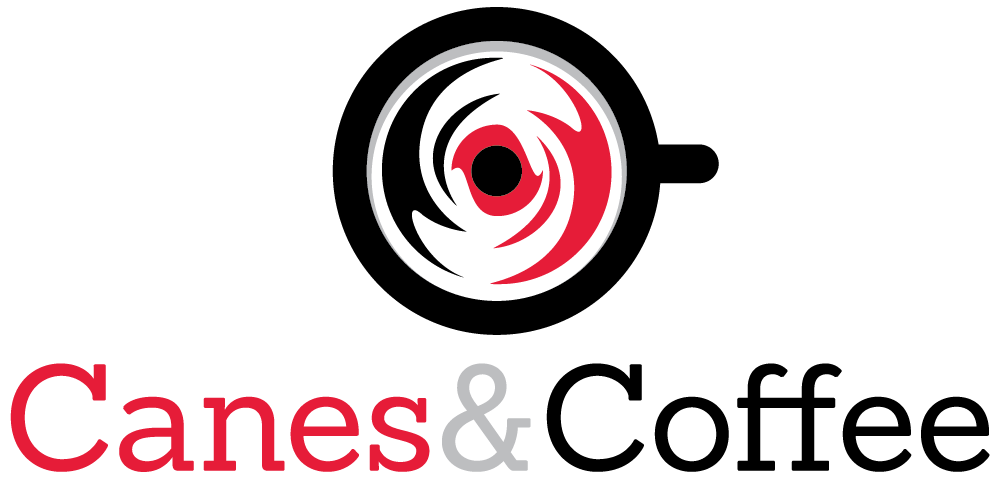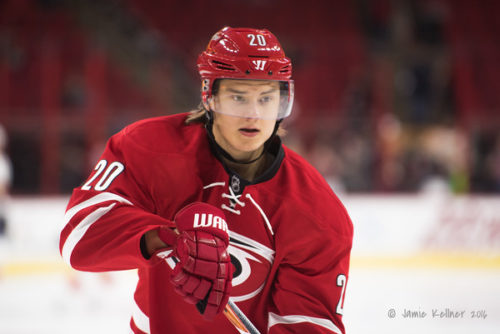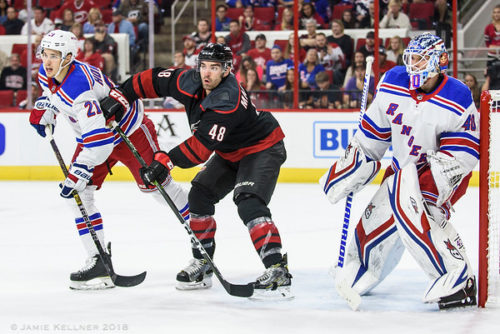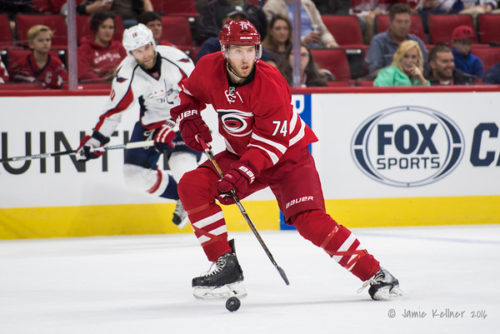Numerous players from the early years of Carolina Hurricanes hockey deserve credit for their role in establishing NHL hockey in North Carolina. Players like Ron Francis and Glen Wesley are recognized in the PNC Arena rafters today for their early leadership and on-ice contributions. Rod Brind’Amour, who is also in the rafters, was obviously instrumental in leading the ultimate achievement bringing the Stanley Cup to Raleigh. And many other players also deserve credit. But in the early days when NHL hockey was being established in North Carolina, I do not think any player was more symbolic of the movement and the team’s evolving community than Arturs Irbe.
Irbe was a quirky underdog and maybe even a bit of a misfit NHLer. Even for the early 2000s, he was undersized for an NHL goalie at only 5 feet 8 inches tall. He was odd, wearing an old school “bucket and cage” type helmet that the NHL had mostly abandoned decades earlier. And he was quirky. With his Latvian accent, rare interview authenticity and other idiosyncrasies ranging from his affinity for well-worn equipment to superstitions he was anything but a stereotypical professional athlete. But he was ours, and he was adored by the fan base. While there is an element of raw performance and winning in the formula, I think Irbe’s fan favorite status was at least equally because he was a perfect match for the fan base and hockey market during his playing days. For those who are newer to Canes hockey fandom, I think maybe an interesting way to picture Irbe would be to imagine if Anton Khudobin’s personality was plopped down right in the middle of 3-4 years of deep playoff runs.
Arturs Irbe was the perfect leader, mascot and face for a hockey community that was very much still figuring things out and was a bit of a misfit too. The fan base was a weird mix of transplanted northerners who grew up with NHL hockey and curious Raleigh sports fans willing to give hockey a try. The experience of trying to join the hockey world was mixed. For every couple welcoming NHL fans, there was one vocal and nasty big market traditionalist who gave hockey and hockey fans in a small non-traditional Southern market no chance. And for whatever reason, it seemed that the more negative a person was on hockey in Raleigh, the more vocal they were. And at a stage when we as fans were ourselves still figuring it out and maybe even a bit self-conscious, it was challenging.
But over time, we as Hurricanes fans just mostly created our own brand of NHL hockey and did it our own way, much like Arturs Irbe. Blessed with an expansive open parking lot, southern weather and experience from the football team that shared the same parking lot, we brought tailgating at a completely unseen level to the NHL. We started our own traditions like meeting the team at the airport upon return from playoff road trips. And when we were not sure exactly what else to do during an intense playoff game, we screamed our lungs out creating a legitimate claim to being the loudest building in the entire NHL for playoff games. The naysayers still exist and might claim that tailgating exists in other places, but those of us who have witnessed it elsewhere understand the difference between our version and others’ versions. And though the naysayers will never admit it or believe it, many of us were there when they measured crazy decibel levels at Canes playoff games and had outsiders vouch for the crowd noise level. There are obviously a ton of memories and a number of players involved in the creation of our Canes community and culture. Many deserve credit. But for me, quirky underdog Arturs Irbe more than any other player is symbolic of those special times when we were creating the foundation for our Hurricanes hockey community and culture.
“Archie,” as he was called, also played a huge role in early Hurricanes success on the ice. After arriving from San Jose before the 1998-99 season, he quickly seized the reins as the starting goalie and kept them through the end of the 2001-02 season. He was the Canes #1 goalie for a short four years plus, but the run was incredibly successful. He led the Canes to their first three playoff appearances in the 1998-99, 2000-01, 2001-02 seasons. He set single season highs with 37 wins (since eclipsed by Cam Ward) and a crazy 77 games played in the 2000-01 season. He also brought a fiercely competitive, underdog type mentality to the ice each and every game and shared it with his teammates.
He also played a significant role in the Canes early playoff success. The 2001 playoffs which were the first in Raleigh did not start as desired and were on pace to be over just as fast as they began. The Canes lost two games in New Jersey and then a third at home, taking a physical beating along the way (concussions to Shane Willis and captain Ron Francis). Irbe was arguably the most valuable player of an undermanned group that rose up and won games four and five. The team won fans’ respect and hearts in the process. He was again the starting goalie for most of the 2002 playoffs. In those playoffs, Irbe’s stellar goaltending was a key ingredient in the Canes successful winning formula that included playing tight defensive games and then pulling out miracles late. He picked up ten of the Canes 13 wins and registered a 1.67 goals against average and 0.938 save percentage in leading the Canes to the Finals and within three wins of capturing the Stanley Cup.
Chronologically, Arturs Irbe was the Canes first goalie. (He officially started in 1998-99 but is arguably the first goalie of memory for many Canes fans.) Statistically, Arturs Irbe is the Canes number two goalie behind only Cam Ward. He is second amongst Hurricanes netminders in games with 309, wins with 130 and shutouts with 20. But maybe most significantly, emotionally and symbolically, the smallish #1 in the old-fashioned ‘bucket and cage’ helmet is fondly remembered as the quirky underdog hero at the very center of the team’s first push to establish Hurricanes hockey in Raleigh. For those contributions, Arturs Irbe is easily deserves a place amongst the greats in Hurricanes history.
Go Canes!



